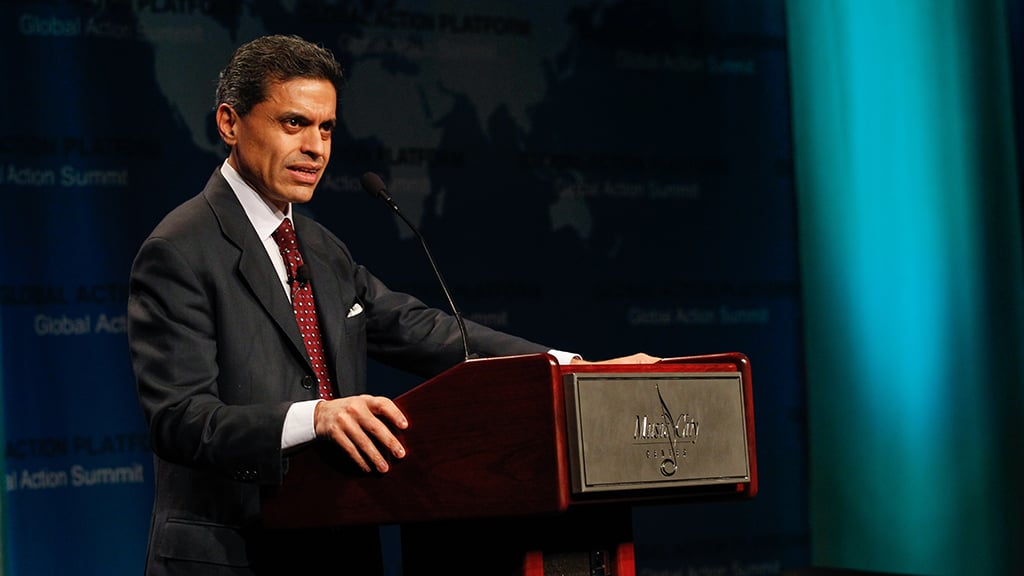Of all Fareed Zakaria’s accomplishments—a wildly successful career in print journalism, book publishing, and television broadcasting—perhaps his most important is also his least appreciated: He has demonstrated that media reporting is next to useless.
It’s been more than a year since two bloggers laid out in gothic detail Zakaria’s pattern of incorporating without credit the work of prominent academics and journalists into his own. Yet Zakaria’s high-flying career has barely wobbled. He still hosts a show on CNN, still writes a column for the Washington Post, and last year published yet another conversation-starting book, In Defense of a Liberal Education (from the epigraph: “The world henceforth will be run by synthesizers . . . .”).
The bloggers weren’t the first to allege that Zakaria took a collaborative approach to journalism. In 2012, he was suspended by CNN and Time magazine after Tim Graham at the right-wing Media Research Center noted he’d included passages by New Yorker writer Jill Lepore in a Time column. In a 2009 dustup, the Atlantic’s Jeffrey Goldberg noted that Zakaria used, without credit, quotes from Goldberg’s interview with Benjamin Netanyahu.
How does Zakaria survive? In part, he has been lucky in his accusers. His external investigation in 2014 came courtesy of two people who speak publicly only under their Twitter handles, @crushingbort and @blippoblappo; they documented Zakaria’s textual sampling on a blog called Our Bad Media. Their pseudonymity has given Zakaria cover: Unlike his chief critics, this line of thought goes, Zakaria publishes under his real name.
Those defending Zakaria, on the other hand, were distinguished members of the trade. Vanity Fair columnist Michael Kinsley compared @crushingbort and @blippoblappo’s work to a “McCarthy-era publication that would put you on the blacklist and stamp you as a Communist so you couldn’t get work in Hollywood,” and Slate Group chairman Jacob Weisberg said the two were “making mountains out of molehills.” Even Goldberg gave a limited endorsement in 2012, writing that Zakaria was “sloppy and callous, but he wasn’t a fabulist.”
After the Lepore kerfuffle, Post editorial-page editor Fred Hiatt said an “overextended” Zakaria had promised to pay more attention to his column. Since then, Hiatt tells Washingtonian, “Fareed has been more than true to his word: He has made the column his priority, and I believe in 2015 it was stronger than ever.”
Zakaria’s alleged offenses, however, are numerous enough that it’s hard simply to dismiss them as “bad manners,” as Weisberg suggested. Filtering Zakaria’s output through Google searches and following up at the library, @crushingbort and @blippoblappo found that Zakaria has made a years-long practice of weaving whole sentences and quotes from other publications into his work, not only in print but in what he says on his CNN show. This technique, often called “patchwriting,” to distinguish it from the artisanal form of plagiarism, still evinces unoriginal thought and still is cheating.
“Everything we posted was verifiable, and the idea that our anonymity somehow excused or lessened Zakaria’s plagiarism always seemed silly,” says @crushingbort (who, like @blippoblabbo, would comment only by e-mail and Twitter direct messages), adding that he “likely will” come clean about his identity at some point.
“The most important part of our real identities: We aren’t journalists,” @blippoblappo says. “We’re two people who did all of this in our free time and who had to stop doing it because we have bills to pay.”
Nonetheless, media reporters (including me) who tried to follow bort and blappo’s leads—examining and opining, trying to get comment from employers and publishers—have moved on. Really, the only careers that got dinged in this whole mess belonged to two Huffington Post journalists who were reportedly suspended after running a post that aggregated accusations against Zakaria without seeking comment from him. Both later left the company.
One regret @blippoblappo has is not building a more “bulletproof” case against Zakaria, “because I’m absolutely sure that a real journalist dedicating their 9-to-5 to the task could do so.”
Except for a statement to Politico, Zakaria has, as best as I could find, pursued a policy of silence about @crushingbort and @blippoblappo. CNN declined my request for an interview with Zakaria, and he even turned down an interview with CNN media correspondent Brian Stelter when he covered their allegations. After the Lepore incident, Zakaria’s outlets “just waited the firestorm out,” says @crushingbort. This time, too, he says, “CNN and the Post made a bet that they could wait out two guys on Twitter with goofy user names, and they were pretty much right.”
Indeed, the moment in media history that l’affaire Zakaria occupies may best explain why he’s been given so many passes. The Washington Post’s top online stories last October—the month before it blew past the New York Times in web readership—included a humor piece reimagining famous quotes as if women had to say them in meetings as well as a speculative item about a “strange star that has serious scientists talking about an alien megastructure.” Zakaria’s columns—a dispatch from Davos (where he also, uh, interviewed Netanyahu) or tightly written advice on how to battle ISIS—serve as a blue-chip counterweight to such easily shareable stuff. “I always learn from his columns, and I think our readers do too,” Hiatt writes in an email. “If The Post had overreacted to the incident you are revisiting, it is our readers who would have lost out.”
@crushingbort told me, “I’m pretty sure that Fareed Zakaria could have plagiarized the entirety of Infinite Jest and still have a job.” That bit of hyperbole may have some logical validity to it, but as David Foster Wallace wrote, “logical validity is not a guarantee of truth.” Or maybe I wrote that? My notes are unclear.
Senior editor Andrew Beaujon can be reached at abeaujon@washingtonian.com.
This article appears in our March 2016 issue of Washingtonian.



















